Overview
The article offers a thorough overview of the duties and responsibilities of office managers, highlighting their essential role in sustaining workplace efficiency and supporting organizational objectives. It underscores that office managers are responsible for:
- Overseeing administrative functions
- Coordinating schedules
- Enhancing communication among departments
This is vital for cultivating a productive work environment, particularly in light of the growing prevalence of remote work and the increasing need for effective management practices.
Introduction
In 2025, the role of an office manager has transformed into a cornerstone of organizational success, blending traditional administrative duties with modern demands of efficiency and communication. As workplaces adapt to hybrid models and the rise of remote work, office managers are increasingly seen as the linchpins that connect various departments, ensuring that operations run smoothly and productivity soars.
With a diverse skill set that encompasses budget management, staff coordination, and facility oversight, these professionals are not just administrators; they are strategic partners in fostering a thriving work culture. This means that their contributions are vital to the overall health of an organization.
This article delves into the evolving responsibilities of office managers, the essential skills required for success, and the educational pathways that lead to this vital role, highlighting the significance of effective office management in today’s dynamic business landscape.
Defining the Role of an Office Manager
In 2025, the role of an administrative supervisor has transformed into a crucial position encompassing a broad spectrum of duties essential for maintaining an effective work environment. Administrative supervisors oversee administrative functions, managing supplies, coordinating schedules, and supervising personnel. They serve as a vital link between various departments, facilitating communication and ensuring organizational objectives are met.
The importance of administrative supervisors in enhancing workplace efficiency cannot be overstated. Statistics reveal that organizations with effective management experience a notable increase in productivity, with 70% of working Americans expressing a desire for a better understanding of their employee benefits. This highlights the necessity for effective communication facilitated by workplace supervisors.
Furthermore, as remote work continues to rise—currently, 24.3% of the workforce is hybrid or fully remote, projected to reach 27.5% by 2028—office supervisors play a pivotal role in adapting performance review systems to accommodate a dispersed workforce. This shift underscores the need for ongoing feedback rather than traditional annual reviews, with 80% of employees preferring this approach.
Specialist insights emphasize the essential role of administrative professionals in promoting organizational success. J.R. Johnivan, a Business and HR Tech Journalist, notes that "merging a lifelong passion for technology and the written word, supervisors are continually balancing conventional practices with next-gen innovations and progress." Their capacity to foster a productive work environment is crucial, as evidenced by case studies showing how effective administrative oversight enhances organizational efficiency.
For instance, companies that have adopted innovative tools for productivity monitoring report improved employee engagement and reduced burnout, addressing challenges posed by digital communication in remote settings. Moreover, organizations that offer professional development opportunities experience a 34% higher retention rate, further emphasizing the role of supervisors in facilitating such initiatives.
In summary, the key functions of an office supervisor encompass responsibilities that extend beyond traditional administrative tasks; they are instrumental in cultivating a cohesive work culture, enhancing communication, and ultimately contributing to the overall success of the organization in 2025.
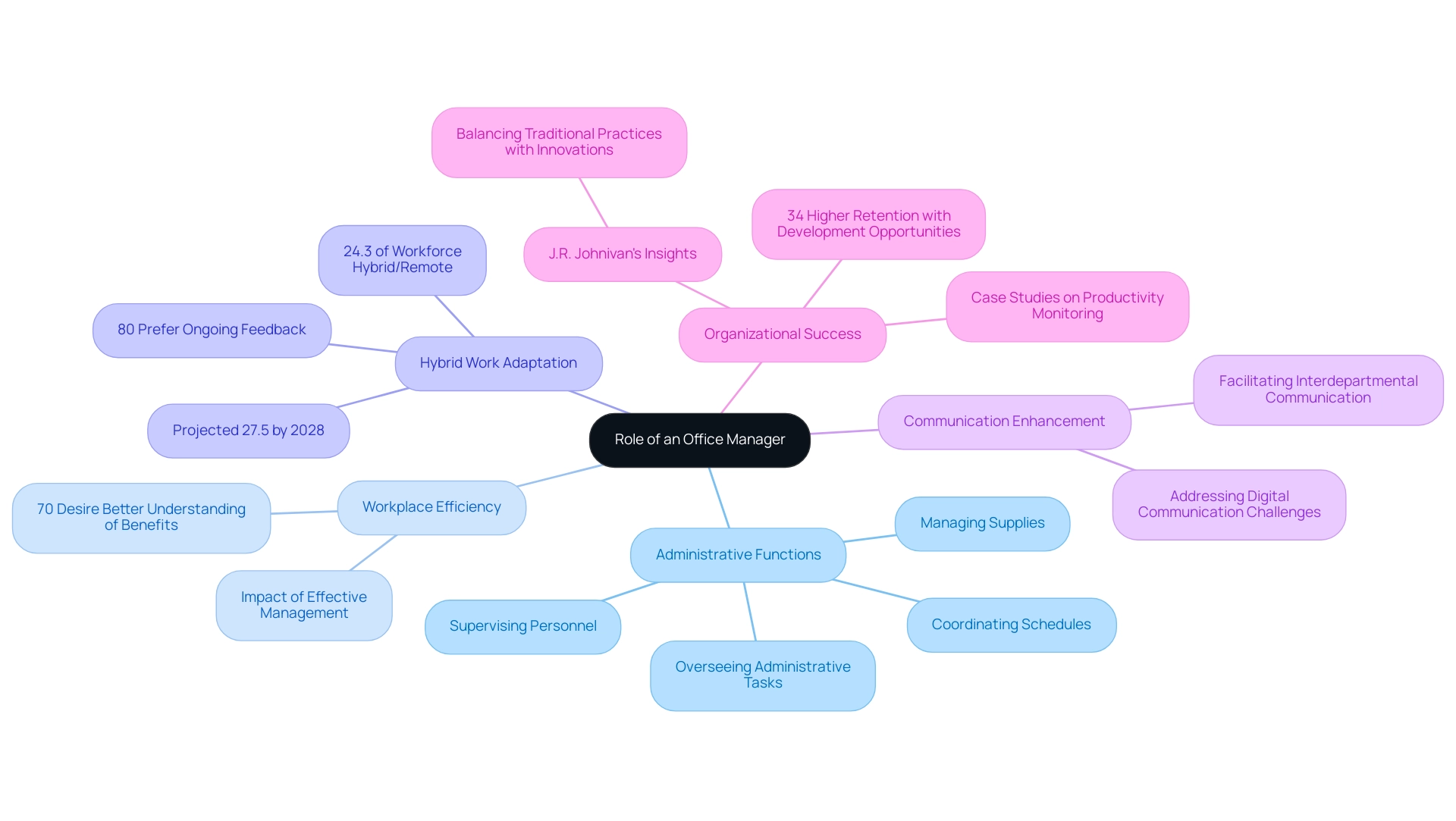
Key Responsibilities of Office Managers
Office supervisors play a pivotal role in ensuring the smooth operation of an organization, fulfilling various office management job duties that are essential for maintaining efficiency and supporting organizational goals. Key responsibilities include:
- Administrative Oversight: Office managers are responsible for ensuring that all administrative tasks are executed efficiently. Scheduling meetings, managing correspondence, and maintaining organized filing systems are essential office management job duties that are crucial for effective communication and workflow.
- A significant aspect of an administrator's role involves supervising workplace budgets. This includes managing expenses and ensuring that financial resources are allocated effectively. In 2025, the average budget handled by administrative supervisors is projected to be substantial, reflecting the growing complexity of financial oversight in organizations. As the performance oversight software sector is anticipated to expand from $5.82 billion in 2024 to $12.17 billion by 2032, supervisors will increasingly depend on technology, such as Kulud's automated expense handling solution, to enhance their office management job duties and budget strategies. Kulud ensures data security through advanced encryption and has been validated by security assessments, providing office supervisors with a trustworthy tool to streamline financial processes. Additionally, Kulud offers features like automated categorization and receipt extraction, which significantly reduce the time spent on manual data entry and improve accuracy in financial reporting. Its affordable pricing structure makes it accessible for freelancers and small business owners, further facilitating effective budget management.
- Effective staff coordination is one of the essential office management job duties vital for fostering a collaborative work environment. Office supervisors are responsible for overseeing administrative personnel, assigning tasks, and executing effective strategies for team collaboration. Case studies indicate that organizations with strong staff coordination practices see improved employee engagement and job satisfaction, with seven in ten workers believing that learning opportunities enhance their connection to the organization. This aligns with the findings from the case study titled "Learning as a Driver of Engagement."
- Ensuring a safe and organized workspace is another essential office management job duty. The responsibilities of office managers include liaising with maintenance and service providers to create a workspace that is conducive to productivity, which is increasingly important as companies adapt to hybrid work models.
- In 2025, the environment of workplace oversight is evolving, with a growing emphasis on professional development and mental health programs, as 40% of employees consider these benefits essential. Industry leaders highlight that effective workplace practices not only streamline operations but also enhance employee well-being and retention. The Asia-Pacific area is anticipated to witness the quickest growth rate of 12.2%, emphasizing the rising intricacy and significance of workplace administration in an expanding market.
- Furthermore, as Georgi Knyazhev remarked, "Kulud has changed my accounting processes, enabling me to save time and enhance communication with my accountants," demonstrating the effect of efficient expense management on administrative management, especially in the realm of budget management. Kulud also assists with tax preparation by enabling users to generate spreadsheets with all necessary financial information, helping businesses avoid missed tax filing deadlines and ensuring individuals don't overlook valuable deductions.
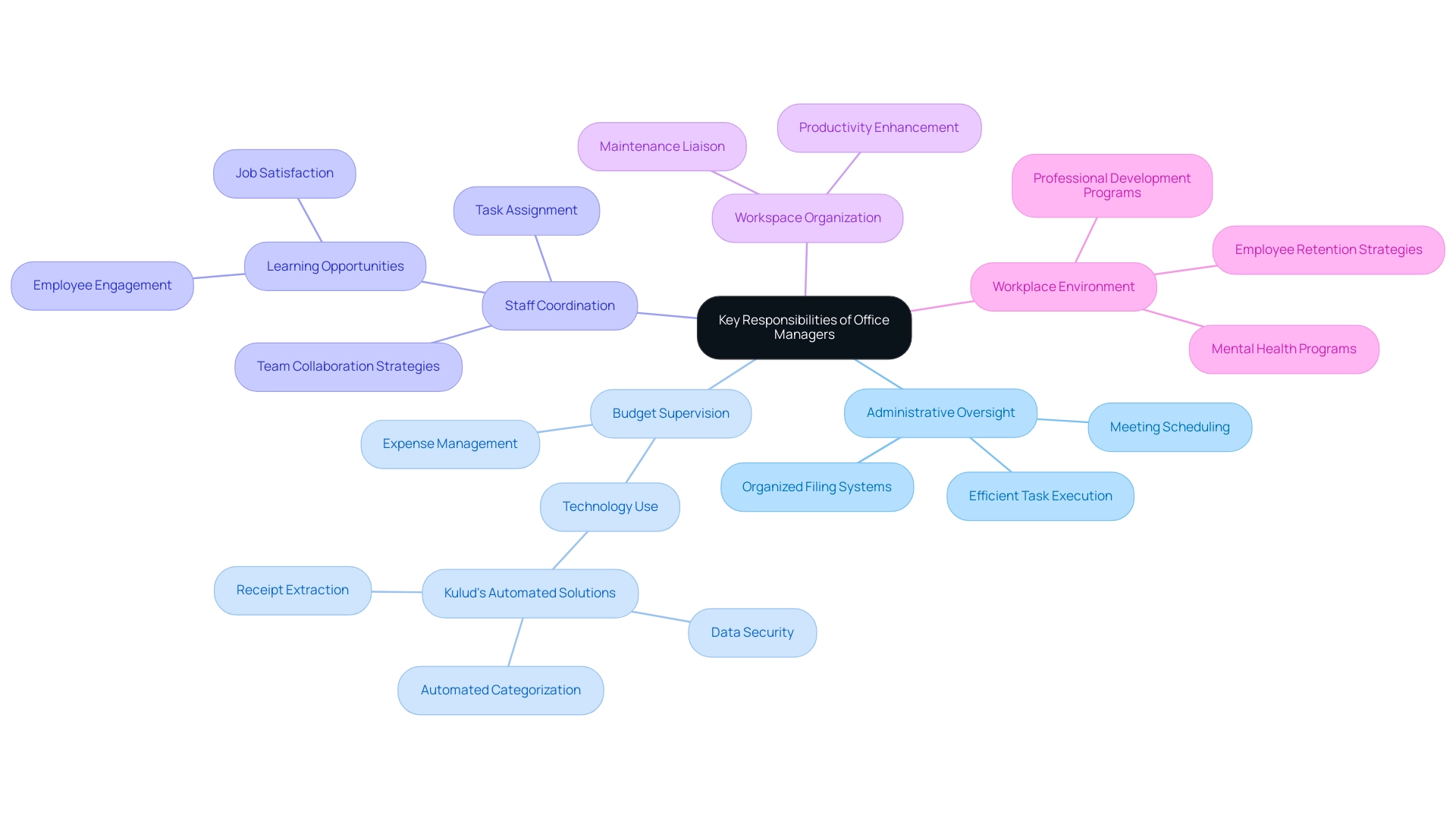
Essential Skills and Qualifications for Success
Effective supervisors in 2025 must cultivate a diverse range of abilities essential for navigating the complexities of contemporary work environments. Key competencies include:
- Organizational Skills: Mastery in managing multiple tasks and prioritizing effectively is crucial for ensuring smooth office operations. This skill enables office supervisors to streamline workflows and enhance productivity.
- Communication Skills: Proficient verbal and written communication is vital for fostering effective interactions with staff, clients, and vendors. Notably, statistics reveal that only 15% of employees feel their supervisors have supported them in building a career plan recently. This highlights the pressing need for strong communication to guide team development and bridge the gap in employee-manager relationships.
One of the key responsibilities of office managers is to excel at quickly identifying issues and implementing effective solutions. This agility is critical in maintaining operational efficiency and addressing challenges as they arise. As emphasized in the case study titled 'Need for AI to Stay Competitive,' leaders recognize the necessity of adopting AI to remain competitive, underscoring the significance of problem-solving abilities in navigating technological changes.
- Technical Proficiency: Familiarity with workplace software and technology is necessary for efficiently managing administrative tasks. Current news indicates that by 2025, COVID-19-related economic uncertainty and rising automation will displace 85 million positions while generating 97 million new ones. Therefore, technical expertise will be increasingly vital for managers to adapt to this evolving job landscape.
- Leadership Qualities: The ability to motivate and lead a team is essential for cultivating a positive workplace culture. Effective leaders inspire their teams to embrace lifelong learning and adapt to changing environments. As Jenny Lin, Global Head of Learning and Growth, states, "With MyGrowth, over 254,000 Siemens people are embracing lifelong learning and cultivating a growth mindset." This illustrates how leadership qualities can foster a culture of continuous improvement.
These crucial abilities, complemented by relevant credentials such as a degree in business administration or supervision, prepare individuals for success in office management roles. Furthermore, case studies demonstrate that organizations emphasizing these competencies experience enhanced team dynamics and operational results, highlighting the essential role of effective communication and organizational skills in workplace administration.
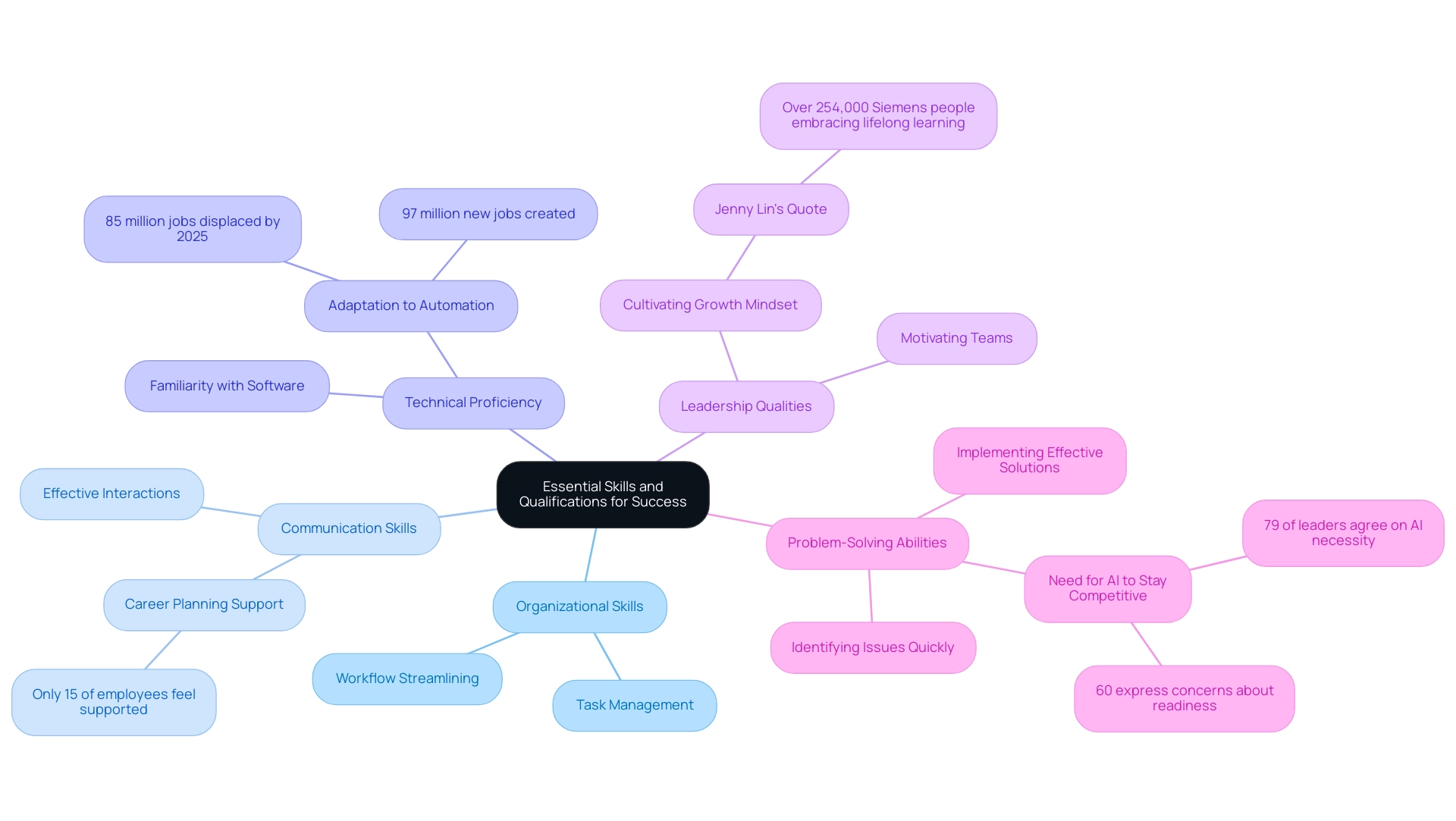
Educational Pathways to Becoming an Office Manager
To embark on a career as an office manager, individuals typically navigate several educational pathways that equip them with the necessary skills and knowledge. A High School Diploma serves as the foundational requirement for entry-level positions, often complemented by relevant work experience. Pursuing an Associate or Bachelor's Degree in business administration, leadership, or a related field significantly enhances job prospects. Research indicates that candidates with degrees are more competitive in the job market, particularly as economic uncertainty and automation reshape employment landscapes.
By 2025, it is projected that 85 million jobs will be displaced due to these factors, making adaptability a critical determinant of career longevity and success in modern work environments. Certifications in administrative roles not only demonstrate expertise but also signify a dedication to professional growth. These credentials can be pivotal in distinguishing candidates in a crowded field.
On-the-Job Training is another vital component. Practical experience gained through internships or entry-level administrative roles is invaluable. Such experiences enable individuals to cultivate essential abilities and adjust to the changing requirements of office management job duties. These educational routes are crucial as they prepare individuals to meet the evolving challenges of the workplace.
Additionally, effective communication has been demonstrated to relate to organizational performance, highlighting the significance of interpersonal abilities in management positions. Organizations that excel in communication tend to promote higher employee retention rates and engagement. This emphasizes the necessity for aspiring supervisors, particularly freelancers who frequently operate in varied environments, to develop these abilities alongside their formal education. Furthermore, leadership interpersonal abilities are regarded as the most essential for managers, with nearly a third of UK adults viewing empathy as the most crucial attribute for managers.
In summary, the combination of formal education, certifications, and practical experience positions individuals for success in office management, particularly as the job market continues to evolve.
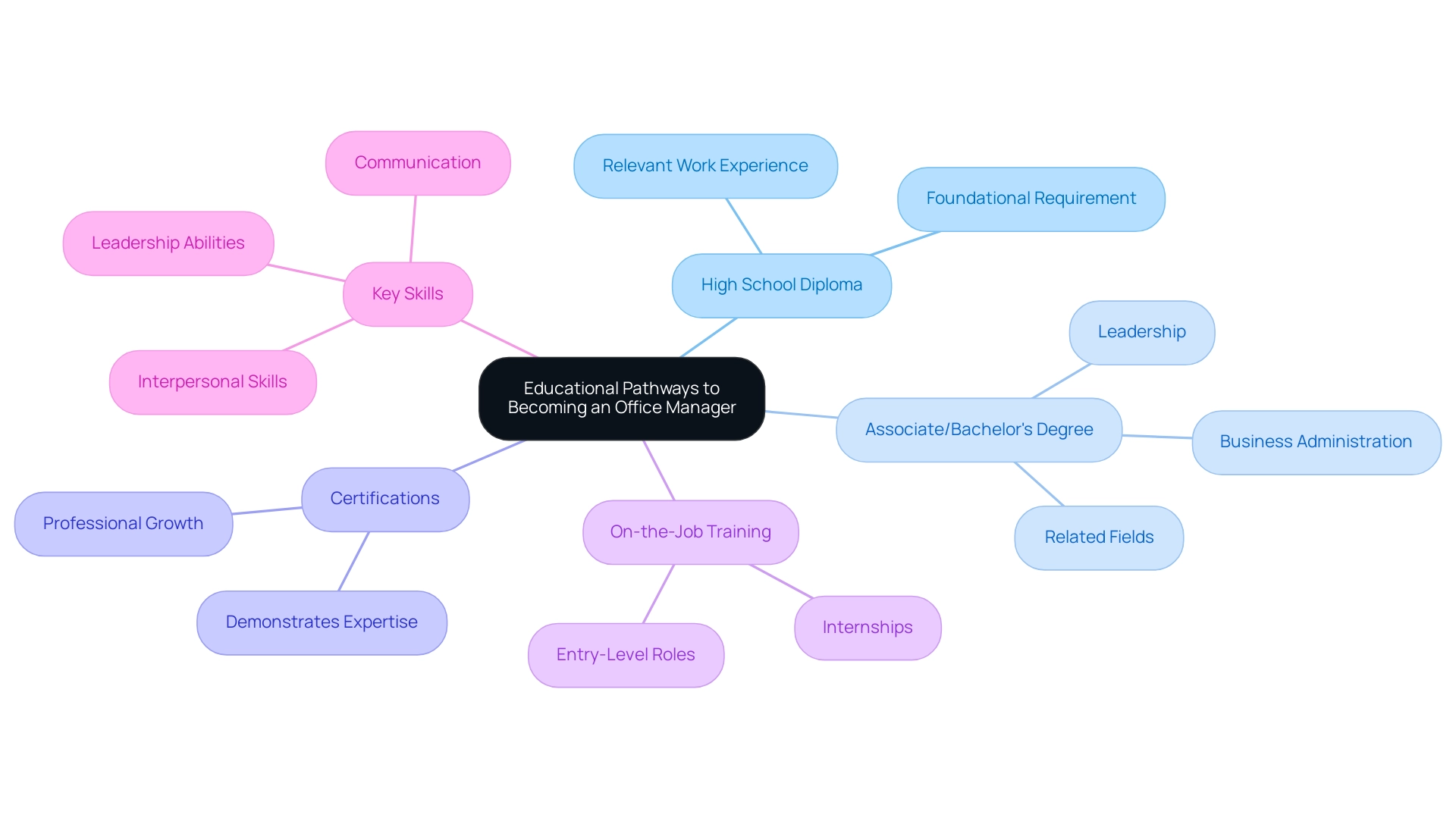
Career Advancement Opportunities in Office Management
Office administration presents numerous opportunities for career growth, enabling professionals to explore various paths that align with their skills and aspirations. Key roles within this field include:
- Senior Office Coordinator: This position entails assuming more complex responsibilities, such as managing larger teams and overseeing intricate operations. Utilizing tools like Kulud for streamlined expense oversight is essential. Kulud simplifies the process by allowing users to log in with their business email, capture invoices and receipts, and automatically match them with bank transactions. This capability enhances the office management duties of an Operations Manager by improving efficiency and productivity within the organization. By linking their bank accounts, supervisors can ensure precise financial tracking.
- Executive Assistant: This role encompasses office management responsibilities, supporting high-level executives, and often necessitates advanced organizational skills. It serves as a crucial link between leadership and staff, particularly with the use of Kulud to simplify financial processes. The ability to export data for VAT or annual reports facilitates compliance maintenance. Additionally, the office management duties of the Human Resources Manager involve leveraging administrative experience to manage employee relations and foster a positive organizational culture. Utilizing seamless accounting exports through Kulud helps maintain accurate financial records, a feature especially beneficial for freelancers managing their finances independently.
- Consultant: Professionals can leverage their expertise to guide other organizations on best practices in office management, contributing to enhanced operational effectiveness, particularly with tools like Kulud that bolster financial oversight. The ease of exporting data empowers consultants to deliver valuable insights to their clients.
These pathways illustrate the potential for growth and specialization within the field, underscoring the significance of continuous professional development. According to the LinkedIn Learning 2025 Workplace Learning Report, organizations that provide consistent feedback experience improved talent attraction and retention rates, further emphasizing the importance of investing in career advancement. The performance management software sector is projected to expand considerably, with a CAGR of 9.7% from 2024 to 2032. Consequently, the demand for skilled personnel in administrative roles is expected to rise, making this an opportune time for professionals to pursue career advancement. Moreover, as Georgi Knyazhev noted, the transformative impact of platforms like Kulud on accounting processes enables office managers to save time and streamline communication with their accountants. This ultimately allows them to focus on scaling their businesses while maintaining accurate financial records.
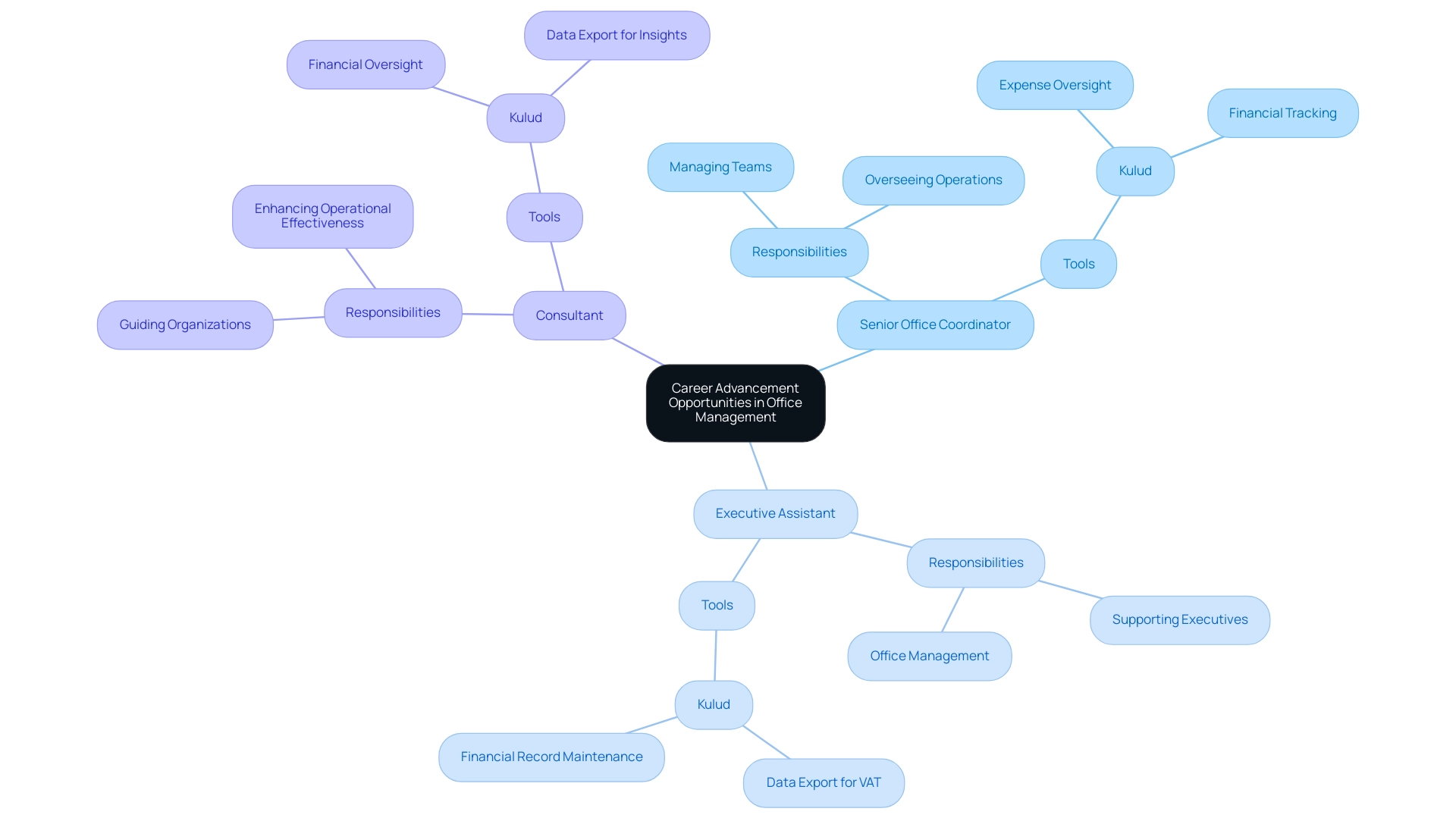
Conclusion
The evolving role of office managers has become increasingly critical in shaping the success of organizations in 2025. By bridging the gap between various departments and fostering effective communication, office managers ensure that administrative functions run smoothly while enhancing overall productivity. Their responsibilities extend beyond traditional tasks, encompassing budget management, staff coordination, and facility oversight, all of which are essential for maintaining a thriving workplace culture.
To excel in this dynamic environment, office managers must cultivate a diverse skill set that includes:
- Strong organizational and communication abilities
- Problem-solving skills
- Technical proficiency
- Leadership qualities
These competencies are vital for navigating the complexities of modern office dynamics and adapting to the ever-changing demands of the workforce, particularly as remote and hybrid work models become more prevalent.
Educational pathways leading to a career in office management are equally important, combining formal education, relevant certifications, and practical experience. By equipping individuals with the necessary tools and knowledge, these pathways prepare future office managers to meet the challenges of today's business landscape effectively.
Ultimately, the significance of effective office management cannot be overstated. As organizations continue to evolve, the role of the office manager will remain pivotal in driving operational success and employee engagement. By investing in their skills and embracing new technologies, office managers will not only enhance their career prospects but also contribute to the resilience and growth of their organizations in an increasingly competitive environment.



